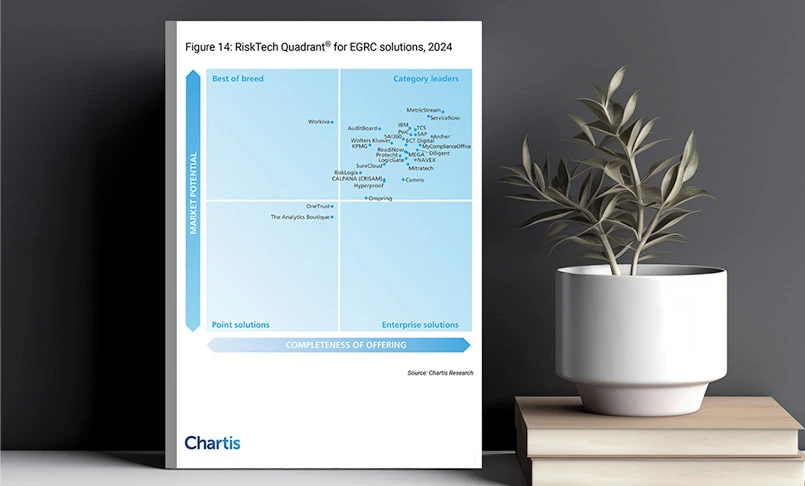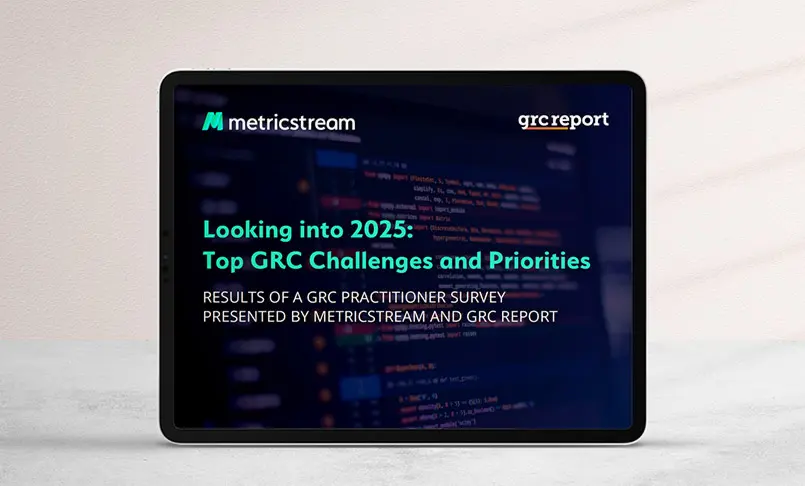How to Automate GRC and Its Benefits
- GRC
- 13 March 24

Introduction
In the dynamic landscape of modern business, the need for effective Governance, Risk, and Compliance (GRC) processes has never been more critical. As organizations navigate the intricate risk and regulatory landscape globally, a robust GRC strategy becomes paramount not just for business success but also to ensure Business As Usual.
MetricStream, a market leader in GRC software products and solutions, underscores the crucial role of automation in GRC programs, enhancing efficiency and ensuring compliance in highly regulated industries. This article explores GRC automation, its importance for organizations, and the steps to seamlessly integrate automation into existing processes.
What is GRC Automation?
GRC Automation is an automation technology that streamlines processes such as risk and compliance management frameworks. It helps to enhance the efficiency of the process, reduce manual errors and ensure real time compliance.
GRC automation tools leverage advanced technologies, such as artificial intelligence and machine learning, to enhance decision-making and mitigate risks effectively. These tools provide a unified platform that enables organizations to manage governance, assess risks, and ensure compliance seamlessly. The automation process involves the use of software solutions to replace siloed, manual, and time-consuming processes, reducing errors and improving overall operational efficiency.
Why GRC Automation, and Why Now?
Recent developments in the business world highlight the increasing significance of streamlining GRC processes and the need for automation in this sphere.
In the United States, where regulatory frameworks continue to evolve, enterprises are grappling with the complexities of compliance. The Securities and Exchange Commission (SEC) has been actively tightening regulations, emphasizing the importance of robust internal controls and risk management. Similarly, in the United Kingdom and Europe, post-Brexit, companies are navigating new regulatory landscapes, necessitating agile GRC processes to adapt to changing compliance requirements.
While the business environment continues to evolve, the advent of Generative AI has brought opportunities for automation to organizations but also posed new problems, such as data privacy and data governance challenges. When a few thousand users in and around the organization are all exposed to new and powerful AI tools, what prerogative must be set to ensure they all operate within the legal framework of the company?
Governance, then, extends beyond compliance with existing norms alone and should take on the ability to predict and plan for changes to a future that is also evolving simultaneously. Specifically, automating the GRC process gives business leaders an opportunity to accurately capture changes both within and outside the organization, make key decisions in time by observing and validating patterns, and set their company up for success and stability at all times.
Benefits of GRC Automation
The business landscape is evolving at an unprecedented pace, with regulatory requirements becoming increasingly complex. Organizations face the challenge of maintaining compliance while simultaneously dealing with intricate governance structures and managing risks effectively. Here are just a few advantages of GRC process automation:
- Efficiency and accuracy: GRC automation tools eliminate manual processes, reducing the likelihood of human errors. Automated workflows ensure consistency in data collection, analysis, and reporting, leading to more accurate results.
- Real-time monitoring: Automation enables real-time monitoring of compliance status and risk exposure. This allows organizations to proactively address issues and implement corrective measures promptly, minimizing the impact of potential risks.
- Enhanced decision-making: GRC automation frameworks leverage advanced analytics to provide actionable insights. This empowers decision-makers with comprehensive data to make informed choices that align with both business objectives and regulatory requirements.
- Resource optimization: Automation frees up valuable human resources by automating routine tasks. This allows skilled professionals to focus on strategic initiatives, adding value to the organization.
- Adaptability to regulatory changes: Regulatory requirements are dynamic, and organizations must adapt quickly to stay compliant. GRC tools are designed to be flexible, making it easier for organizations to adjust their processes in response to changing regulations.
GRC Automation: 8 Key Aspects to Consider
Stakeholder involvement and mapping locus of control
Identifying key stakeholders is crucial to the success of GRC automation. These stakeholders may include technology officers and managers, implementation partners for various initiatives, end-users and report validation providers, Chief Risk and Compliance Officers, and IT leaders.
Understanding their roles and responsibilities is vital in mapping the locus of control. Conducting workshops and interviews can help unravel the intricate web of relationships and dependencies. By fostering collaboration between IT, risk management, and compliance teams, organizations can gain a holistic perspective, ensuring that diverse viewpoints contribute to the decision-making process.Establishing a clear roadmap for GRC automation
After outlining the importance of optimizing controls for risk management, the next crucial step involves establishing a clear roadmap for GRC automation. This includes defining key milestones and expected outcomes, crafting a comprehensive program management plan, and delineating specific responsibilities. Automation constitutes a lengthy endeavor, necessitating alignment from senior leadership, a cultural shift, and leveraging supporting technology to forge a durable alliance for sustained success.
Understanding limitations in existing systems
Conducting a thorough assessment of existing systems and processes requires a comprehensive understanding of the organization's technological and hierarchical landscape. Engaging business leaders, IT professionals, and system architects in this process ensures a nuanced evaluation.
It is important to remember that automating a function as diverse as GRC must not be hurriedly carried out in a single phase. Phase-wise planning and execution are helpful, and experts in GRC automation must be roped in early on in the process to help focus on aspects that are important.
Prioritizing feature deployment involves collaborating with end-users to identify key pain points and critical needs. Establishing a cross-functional team, including representatives from risk management, IT, assurance, and compliance, can provide valuable insights into the order of priority for deploying features that address compliance and risk management challenges.Solution selection and integration
Selecting a GRC automation solution demands a nuanced evaluation of organizational needs. This involves not only understanding the technical requirements but also considering the cultural aspects of the organization.
When choosing an integrated GRC solution do consider if the vendor has experience delivering projects in the same industry or in a similar context as your organization.- How well the various GRC processes can be managed in a single tool?
- How long is the learning curve?
- How can you, as a customer, contribute and influence future innovations?
- Is there a forum or customer community where you can discuss industry best practices and learn from each other?
- What challenges were the other customers able to solve with the implementation?
- How does the vendor approach projects of this nature?
- Can they help support end-user training needs?
- Are they familiar with greenfield and brownfield implementations in large and complex projects?
- Can the tool provide agility and support us in our GRC automation maturity journey in the future?
- How flexible is the tool to integrate with your other tools and data sources?
- What data security measures the vendor takes to ensure your data is safe? Does it the have required certifications?
- Does the vendor provide enough support- both technological and GRC domain-specific?
Additionally, pilot testing and phased implementations can help identify potential challenges and streamline integration.
Planning for known-unknowns and unknown-unknowns
Identifying potential risks and consequences of poor GRC automation necessitates a comprehensive program risk assessment. Engaging risk management experts and legal advisors can shed light on potential legal and business implications.
Establishing contingency plans involves a collaborative effort between risk management, legal, and IT teams. Proactive monitoring mechanisms, such as regular audits and automated alerts, can provide early indicators of potential issues.Emphasizing the importance of compliance involves communicating the potential consequences to all stakeholders and fostering a culture of accountability and responsibility.User training
Developing a comprehensive training program requires collaboration between training professionals, subject matter experts, and business users. Identifying key users and stakeholders in each department ensures that training programs are tailored to specific needs. Providing ongoing support involves establishing a dedicated helpdesk or support team. Regular communication and feedback sessions help address user queries and concerns. Fostering a culture of continuous learning involves creating a repository of training materials and resources, enabling users to stay updated on system changes and enhancements. On-demand training videos and ensuring in-app contextual help with AI chatbots can significantly enhance user support and experience.
Why is training important, especially with automation in the picture? Often, we notice that the ROI on automation projects is lower than projected, and a major cause of this is end-users not being able to leverage the solution to its full potential. Effective training, then, is not only about having the right kind of material and modules but intervening at the right time to support a successful implementation.Fine-tuning the automation process
Regularly assessing the performance of GRC automation processes involves establishing key performance indicators (KPIs) and metrics. Engaging data analysts and performance experts can provide insights into system efficiency. Fine-tuning the system based on user feedback requires creating feedback loops and involving end-users in the improvement process.
Implementing continuous improvement measures involves establishing a feedback mechanism and a dedicated team to address identified areas for optimization. This iterative approach ensures that the GRC automation system evolves in tandem with organizational needs.Leveraging artificial intelligence (AI)
Today, there is no conversation on technology without a conversation on AI. With the advent of the era of Generative AI, there are both pitfalls and opportunities specific to GRC. Even a task as seemingly straightforward as end-user training can benefit from a purpose-build ‘GovernanceGPT’ of sorts. Analytics and reporting can take a giant stride forward if they were to bring conversational capabilities into how users interact with the reports generated for them.
Needless to say, the use of AI brings the need for more expertise into the picture, and a good automation tool is self-reliant in how it brings these various stakeholders together to achieve cohesive results.
Evaluating the role of artificial intelligence in enhancing GRC processes involves collaborating with data scientists and AI experts. Understanding the specific requirements of the organization and the GRC domain is crucial in determining the appropriate use of AI.
Leveraging AI for predictive analytics requires training machine learning algorithms with historical data and engaging domain experts to validate outputs. Integrating machine learning algorithms for data-driven insights and decision support involves close collaboration between data scientists, IT professionals, and GRC experts. This holistic approach ensures that AI is applied judiciously to enhance the overall GRC automation framework.
Challenges in GRC Automation
A thing of beauty is a joy forever, and that holds especially true for complex implementations such as GRC automation. When done right, GRC automation brings forth a multitude of benefits for organizations aiming to navigate the complex landscape of governance, risk, and compliance.
That said, points of failure are many, and a project of this nature can quickly crumble if not led by an able governance team. Here are just a few challenges that could arise.
Integration complexity:
Integrating GRC automation tools with existing systems can be complex and may require significant effort.
Resistance to change:
Employees may resist the transition to automated processes, requiring effective change management strategies.
In both these cases above, clear communication on the need for such automation in ways that resonate with each stakeholder often solves the problems before they begin to take root. Every consideration should be taken into account and designating a concerns manager could be an important way of ensuring success well before the project begins.Cost considerations:
The initial investment in GRC automation tools and training may pose financial challenges for some organizations.
That said, even in the context of a global recession, the needs and methods of doing business do not take a backseat, and organizations find that the return on investment of GRC automation is far higher than the upfront cost of implementation. Please reach out to us to help calculate the ROI of GRC automation for your specific use-case.Data security concerns:
Handling sensitive data in an automated environment raises concerns about data security and privacy.
As a core mandate for us at MetricStream, all our automation solutions are designed with data privacy as a core priority and not just a bolt-on afterthought.Customization requirements:
Organizations with unique GRC needs may face challenges finding automation solutions that align perfectly with their requirements. However, with the right solution provider, these integrations are more than just possible.
Power Your GRC Automation Journey with MetricStream
In the dynamic landscape of modern business, the adoption of GRC automation is not merely a choice but a strategic imperative. MetricStream's emphasis on providing comprehensive GRC automation solutions underscores the growing importance of leveraging technology to enhance governance, manage risks, and ensure compliance.
Careful consideration of limitations in existing systems, solution choices, and integration with existing tools is essential for a successful implementation. The consequences of poor automation underscore the need for a meticulous approach, emphasizing user training, fine-tuning, and the judicious use of AI in the GRC context.
By embracing GRC automation, organizations can unlock efficiency, improve risk management, and navigate the intricate web of compliance requirements with agility. The road to automation may present challenges, but the long-term benefits far outweigh the initial hurdles, positioning organizations for sustained success in an ever-changing business environment.
Our Enterprise GRC solution automates risk and compliance data from across the enterprise and third-party vendors into actionable business intelligence for risk-aware decision-making.
Interested to learn more? Request a customized demo now.








